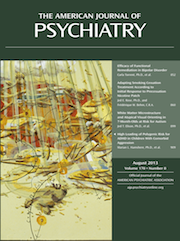Clozapine-Induced Obsessive-Compulsive Symptoms in Bipolar Disorder
To the Editor: Clozapine remains the best option for the large proportion of patients with treatment-resistant schizophrenia. Other data support its use for treatment-resistant bipolar disorder. Despite these therapeutic advantages, clozapine is underutilized because of the risk of serious complications (e.g., agranulocytocis) and more common side effects (e.g., sialorrhea). It has been recently reported that 38.9% of patients receiving clozapine therapy report past-week obsessive-compulsive symptoms (1). We document two cases of a clear temporal association between obsessive-compulsive symptoms and clozapine.
“Mr. A,” a 52-year-old man with a diagnosis of bipolar I disorder, had been hospitalized for mania with psychosis at age 34 and had shown partial response to various antipsychotics and mood-stabilizers. At age 38 he took clozapine, 600 mg/day, and experienced full symptom remission and a return to good psychosocial functioning. He developed disabling checking behaviors 2 years later, which were relieved with sertraline, 200 mg/day. At age 50, the patient insisted on discontinuing clozapine and sertraline. At 100 mg/day of clozapine, his obsessive-compulsive symptoms completely resolved. However, within 2 months, the patient developed a full manic episode requiring hospitalization. He was stabilized on clozapine, 300 mg/day, and discharged, but within 4 months, the checking behaviors returned and sertraline was restarted, bringing partial relief. A year later, he again insisted on reducing the clozapine dosage, and the cycle of obsessive-compulsive symptom remission, mania, response to clozapine, re-emergence of obsessive-compulsive symptoms, and improvement with sertraline was observed.
“Mr. B,” a 42-year-old man with a diagnosis of bipolar I disorder, was hospitalized several times for mania with psychosis and showed partial response to pharmacotherapy. At age 28, he started clozapine and achieved symptom resolution. Within 6 months, he developed disabling checking behaviors, which responded minimally to serotonin reuptake inhibitors. When he first presented at our clinic, the patient was taking 200 mg/day of clozapine, with severe checking behaviors but without mania. Clozapine was tapered over 6 months with cross-titration of quetiapine. Obsessive-compulsive symptoms dramatically improved with 100 mg/day of clozapine, but the patient experienced mania. This eventually resolved with 1,200 mg/day of quetiapine. One year after clozapine discontinuation, the patient’s obsessive-compulsive symptoms remitted and psychosocial functioning improved.
Both cases illustrate clear temporal relationships between clozapine and the development of obsessive-compulsive symptoms in patients with no history of the condition. In Mr. A, over 15 years we witnessed the late appearance of obsessive-compulsive symptoms, with complete resolution after discontinuation of clozapine and rapid recurrence of the full syndrome upon restarting the drug. This on-off-on cycle was repeated within a year. The case of Mr. B illustrates the potential severity of clozapine-induced obsessive-compulsive symptoms and the marked improvement with discontinuation. Both cases involve bipolar disorder, suggesting that obsessive-compulsive symptoms with clozapine occur independently of schizophrenia. This finding is potentially clinically relevant and, to our knowledge, previously unreported, although a lack of clozapine blood levels is a limitation of our interpretive ability. Clozapine is a choice for treatment-resistant bipolar disorder, but obsessive-compulsive symptoms can significantly complicate therapy.
1



